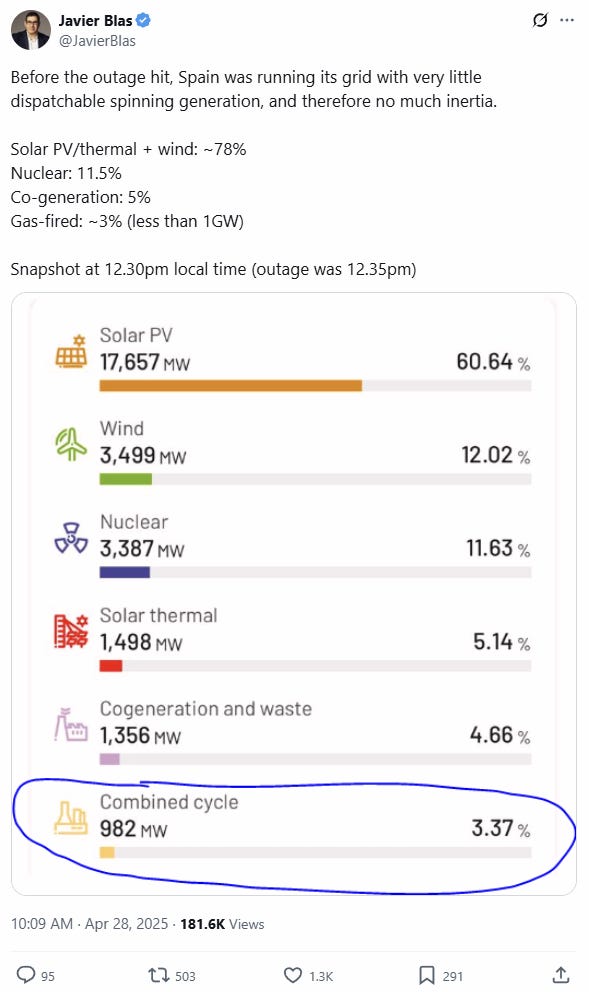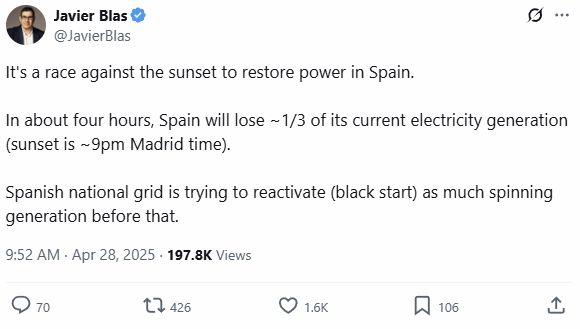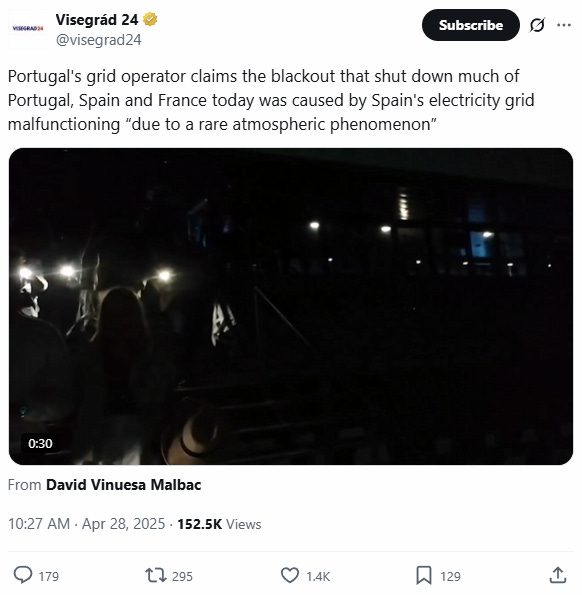"Rare Atmospheric Phenomenon" Sparks Largest Blackout on Record in Spain, Portugal
"... normalisation of the system could take up to a week." Whatever this was shook the entire European grid.
This article originally appeared on ZeroHedge and was republished with permission.
Guest post by Tyler Durden
Six days ago, the media celebrated a significant milestone: Spain’s national grid operated entirely on renewable energy for the first time during a weekday.
At 12:35 pm today local time, the lights went out across Spain and Portugal, and parts of France.
As Michael Shellenberger write at PUBLIC, this wasn’t just a Spanish blackout. It shook the entire European grid.
...none of this should have been a surprise. The underlying physics had been understood for years, and the specific vulnerabilities had been spelled out repeatedly in technical warnings that policymakers ignored.
...
As countries replaced heavy, spinning plants with lightweight, inverter-based generation, the grid became faster, lighter, and far more sensitive to disruptions. That basic physical reality was spelled out in public warnings as far back as 2017.
...
Although political leaders promised that renewable energy would provide stable, affordable power, in practice, Spain grew more reliant on the remaining nuclear and natural gas plants to sustain inertia — even as the government pushes them to close.
...
Despite all these warnings, political and regulatory energy in Europe remained focused on accelerating renewable deployment, not upgrading the grid’s basic stability. In Spain, solar generation continued to climb rapidly through 2023 and early 2024.
Coal plants closed. Nuclear units retired.
On many spring days by 2025, Spain’s midday solar generation exceeded its total afternoon demand, leading to frequent negative electricity prices.
The system was being pushed to the limit.
And today, at 12:35 pm, it broke.
...
Spain’s blackout wasn’t just a technical failure. It was a political and strategic failure.
...
Unless Spain rapidly invests in synthetic inertia, maintains and expands its nuclear fleet, or adds some other new form of heavy rotating generation, the risk of future blackouts will only grow worse.
Read Michael Shellenberger's full take here...
* * *
Update (1126ET):
Portugal's grid operator, REN (Rede Eléctrica Nacional), claimed that the massive power outage affecting Portugal and Spain was sparked by a "rare atmospheric phenomenon," specifically "extreme temperature variations" in the Spanish electricity grid.
British media outlet LBC News provided more color on REN's claim:
Due to these variations in the interior or Spain, there were "anomalous oscillations in the very high voltage lines (400 KV), which is a phenomenon known as 'induced atmospheric vibration'".
"These oscillations caused synchronisation failures between the electrical systems, leading to successive disturbances across the interconnected European network."
. . .
REN added that normalisation of the system could take up to a week.
Bloomberg's Javier Blas noted:
And this:
Additional BBC News headlines of the chaos unfolding across Europe's Iberian Peninsula:
Delays at Spanish and Portuguese airports
In London, Gatwick reports delayed flights to affected areas
Portugal blames outage on 'fault in Spain's electricity grid'
'Extreme temperature variations in Spain' contributed to outage - Portuguese grid officials
Restoring power across Portugal 'could take up to a week'
No indications of any cyber attack, says European Council president
Power back on in some substations, says Spain's electric operator, but railways still suspended
French operator supplying electricity to Spain
Grid operator says power returning in parts of Iberian peninsula
Disruptions...
"I'm in Spain and trust me the issue isn't the darkness…No payments possibles without cash (so no food and transportation), very limited internet and no clue whether it'll actually be resolved," one X user told Javier.
Copyright 2025 ZeroHedge








When I used modeling software for electrical stability (motor starts causing voltage dips) in microgrids, a common input is -
what is the rotational inertia of the generator(s) (with gas turbine or steam turbine, and reduction gear),
because the more the rotational inertia - the less the voltage dip.
When I finished a course on electrical stability, I told Dr. Mo: When you stability engineers fail, we protection engineers take over. He did not like the comment.
Retired Professional Engineer, electrical
What exactly is a "Rare Atmospheric Phenomenon" and how does one prepare for something like this?